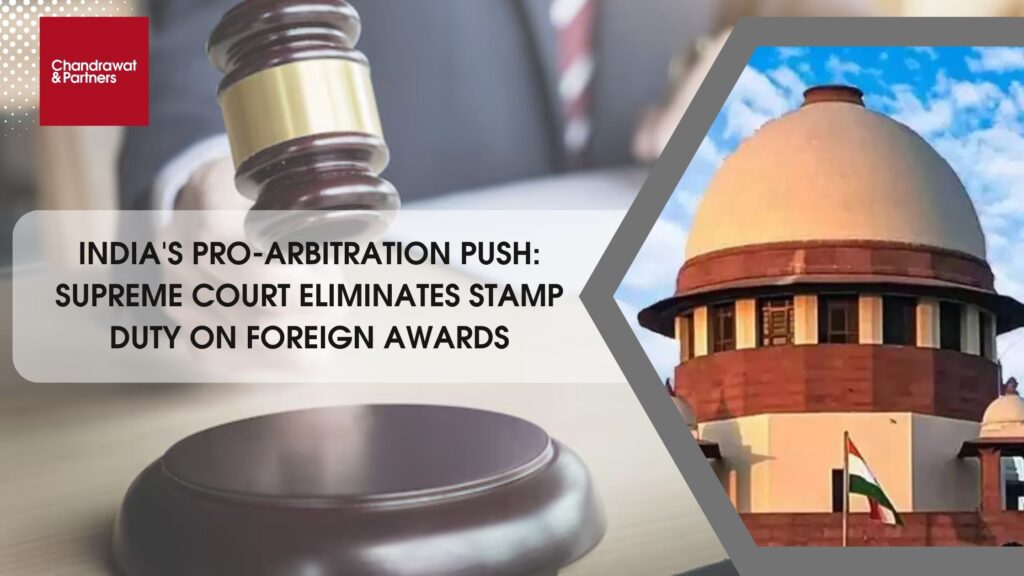
Share :
BACKGROUND
The recent ruling by the Indian Supreme Court in the case of Shriram EPC Ltd vs Rioglass Solar SA (Shriram EPC case) solidifies India’s dedication to upholding international arbitration decisions, marking a significant shift in the country’s approach to arbitration enforcement. The legal dispute between the appellant and respondent serves as a testament to the changing dynamics of arbitration enforcement in India. The dispute arose out of an arbitral award filed in London in February 2015 under the rules of the World Trade Organization.
FACTS
An award was issued by the International Chamber of Commerce (ICC) in London, requiring the Appellant to compensate the Respondents with damages and interest. Following this decision, the Appellant contested the award in the Madras High Court, invoking Section 34 of the Arbitration and Conciliation Act, 1996 (the “Arbitration Act”).
The Single Bench, however, ruled in favour of the Respondents. Subsequently, the Respondents submitted a petition under Section 47 of the Arbitration Act, seeking to enforce the foreign award. The Madras High Court granted this petition, allowing the Respondents request for enforcement.
The Appellants then took up the matter to the Division Bench, where one of their key arguments was that the foreign award couldn’t be enforced due to non-payment of stamp duty. However, this appeal was rejected. As a result, the Appellants filed a special leave petition in the Supreme Court, focusing solely on the issue of stamping the foreign award.
RELEVANT ISSUES
The Supreme Court deliberated on two crucial issues that would determine how Indian enforcement of international arbitration would proceed in the future.
- Whether foreign rewards fell under the description of “award” in Schedule I of the Indian Stamp Act of 1899. This distinction was important because it would establish whether stamp duty was applicable to such awards under Indian law.
- Whether failing to pay stamp duty on a foreign award would make it unenforceable under Sections 48 and 49 of the Arbitration and Conciliation Act 1996. This question was particularly significant for businesses and legal practitioners involved in international disputes.
APEX COURT’S JUDGEMENT
A two-judge bench rendered a decision in September 2018 that significantly altered India’s international arbitration market. This ruling settled the particular issue at hand and established a precedent that would impact international arbitration in India going forward. The Supreme Court’s ruling clarified that the Stamp Act initially applied only to awards made in British India. Awards from princely states were not covered by this Act and were thus considered foreign awards. The Court also noted that the current Arbitration Act maintains a clear distinction between domestic and foreign awards.
The Supreme Court placed reliance on the judgment of the Madhya Pradesh High Court in Narayan Trading Co. vs. Abcom Trading Pvt. Ltd., which held that when the Arbitration Act 1996 was amended, no amendment was made to the definition of the term “award” under the Stamp Act and that similar to the Schedule in the Stamp Act that lays down the stamp duty payable was not amended to include a foreign award.
In light of the above, the Supreme Court held that the mere fact that a foreign award did not borne stamp duty would not make such a foreign award unenforceable.
THE OBSERVATION
The Court’s decision was centred around these two points. Interpretation of the word “award” in the Stamp Act encompasses overseas awards, outstanding stamp duty might perhaps obstruct the execution of these awards in India. The significant ruling in the Shriram EPC case reinforces Indian courts’ growing support for arbitration. It eliminates the need for stamp duties, which previously hindered the enforcement of foreign arbitral awards. This decision prevents parties from unfairly delaying or obstructing the enforcement of these awards through legal tactics.
However, it is pertinent to note that this judgment has financial implications for the Indian government. Allowing foreign arbitral awards to be enforced without stamp duty results in a revenue loss. Given that international commercial arbitrations often involve high-value deals, this could lead to substantial financial losses to the government.
The ruling thus balances the promotion of arbitration and easier enforcement of foreign awards against potential fiscal impacts on the government.
HOW WE CAN HELP
● Our experts specializes in arbitration and dispute resolution. We provide robust representation in both domestic and international arbitration matters. Our recent success in eliminating stamp duty on foreign awards showcases our commitment to ensuring smooth enforcement of arbitration decisions, thus protecting your interests efficiently.
● Our team offers expert advice and services in corporate and commercial law, helping businesses navigate complex legal landscapes. Our services include company formation, mergers and acquisitions, contract drafting and negotiation, and compliance with regulatory requirements.
● Our firm assists clients with matters related to international trade and investment. We provide strategic advice on cross-border transactions, trade regulations, and investment opportunities, ensuring that your business operations are compliant with international standards.
For more information or queries, please email us at
enquiries@chandrawatpartners.com




